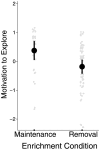How enrichment affects exploration trade-offs in rats: implications for welfare and well-being
- PMID: 24376721
- PMCID: PMC3871681
- DOI: 10.1371/journal.pone.0083578
How enrichment affects exploration trade-offs in rats: implications for welfare and well-being
Abstract
We propose that a comparative approach to well-being could be the key to understanding 'the good life.' Inspired by current theories of human well-being and animal welfare, we designed a novel test of exploration behavior. Environmentally and socially enriched Long-Evans female rats (N = 60) were trained in four simultaneously presented arms of an eight-arm radial-maze. They learned to expect successes in two arms and failures in the other two. After training, 20 animals remained in enriched housing (enrichment-maintenance) while 40 animals were re-housed in standard, isolated conditions (enrichment-removal). Two weeks later, all animals were re-tested in the maze, initially with access to the four familiar arms only. In the final minute, they also had access to the unfamiliar ambiguous-arms. Though both groups showed significant interest in the ambiguous-arms (P<.0001), the enrichment-maintenance group showed a significantly greater exploratory tendency (P<.01) despite having equivalent levels of activity (P>.3). Thus, we show not only that rats will abandon known rewards and incur risk in order to explore, indicating that exploration is valuable in its own right, but also that individuals with (vs. without) enriched housing conditions are more likely to engage in such exploratory behavior. This novel test contributes to the body of knowledge examining the importance of exploration in humans and other animals; implications for animal welfare and human well-being are discussed.
Conflict of interest statement
Figures



References
Publication types
MeSH terms
Grants and funding
LinkOut - more resources
Full Text Sources
Other Literature Sources

